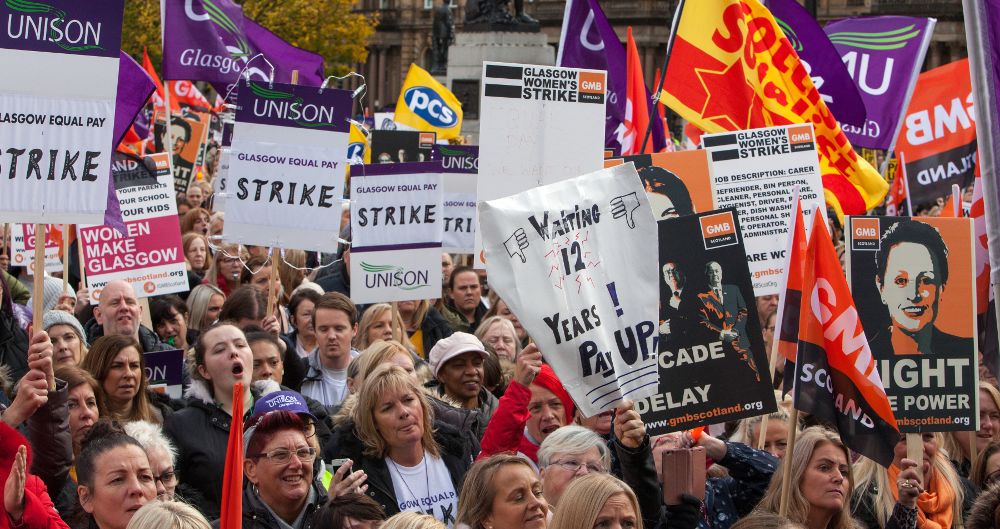
by Richie Venton, SSP national workplace organiser
Active trade unionists and workers are increasingly convinced that the Labour Party under Sir Keir Starmer is not on their side, and that when some of their Union membership fees are used to fund such a feeble, anti-socialist opposition to the Tories, it’s like handing hard-earned cash to an arsonist intent on burning down your own house.
However, tens of thousands who turned to the SNP in recent years, in the hope it was a worker-friendly, pro-trade union alternative, are beginning to grasp the full significance of the old proverb about jumping out of the frying pan into the fire. Both ways they’re badly burnt!
From Frying Pan to Fire
Thousands of Scottish NHS staff who voted SNP in the hope of change and fair pay suffered a brutal awakening when the SNP government imposed a pay rise only marginally better than that conceded by Boris Johnson – which is now further devalued by the 10% leap in National Insurance Contributions.
Last year, hard-pressed, underpaid, undervalued care workers witnessed the grotesque spectacle of the combined votes of the Tories and SNP defeating a proposal in the Scottish Parliament for collective bargaining rights for trade unions in the care sector.
Further Education college lecturers were driven to strike action during a year-long battle to stop lecturers being replaced by instructor/assessors on drastically worse wages and conditions, plus use of the notorious fire-and-rehire weapon to impose this.
The Scottish government and its First Minister stood aside for nearly a year, refusing to back EIS-FELA union members, despite the government being the FE sector’s prime funder. It was only the combination of sustained strike action – up to and including during the Scottish elections – and ferocious political pressure on them by strikers and their allies, that eventually cornered the SNP government into bringing their influence to bear on college bosses.
Workers on Scottish ferries have similar tales to tell.
Railworkers: from Heroes to Zeros
But a section of workers who have particularly borne the brunt of the SNP’s thinly disguised pro-big business ideology and policies in practice are Scotland’s railway workers.
On top of the critically important public services they provide, and the pivotal role a decent railway service could and should play in combating the climate crisis, railway workers are people who put their lives on the line to keep trains running throughout the killer pandemic. But as several of them have said to me, they’ve gone from being heroes to zeros!
The Scottish government leased out Caledonian Sleeper Services to the notorious SERCO profiteers, and when this outfit – owned by Tory Winston Churchill’s grandson – refuses to grant a single penny pay increase to staff who work 12– to 15-hour shifts, the SNP government refuses to lift a finger.
They fund SERCO through Coronavirus Emergency Measures Agreements to the tune of tens of millions, but don’t see fit to even publicly support the staff, let alone instruct SERCO to cough up decent pay from the public money they’ve been handed.
SNP Government Refuse to Negotiate
For most of 2021, conductors, ticket examiners and other grades of workers on ScotRail have been asking the Scottish government to step in and implement pay equality across all grades, by giving enhanced payments for working their rest days, as only ScotRail drivers currently get.
Enhanced payments which all staff got prior to the pandemic, before being withdrawn, on the SNP government’s watch. After being repeatedly blanked by the government, these RMT members voted to stage a succession of strike actions on their Sundays off, but still Nicola Sturgeon’s administration refused to intervene and find a just settlement.
Anti-union Attacks by SNP MSPs
Now as the COP26 gathering in Glasgow looms, the SNP are desperate to wave their green credentials in front of the government leaders, bankers, corporations, NGOs and other luminaries heading for Scotland.
In a shocking display of anti-trade union, anti-worker sentiments, the five Glasgow SNP backbench MSPs have used the media to launch an attack on the RMT union and its members for daring to consider industrial action during COP26, in pursuit of what would be their first pay rise in 3 years.
The five MSPs, Bob Doris, James Dornan, Bill Kidd, John Mason and Kaukab Stewart, declared to the media:
“We support the right of every worker and union to engage with their employers to seek a pay deal but this is an unhelpful way for the union’s London bosses to go about kick-starting those negotiations.
“The people of Scotland – and the watching world – may not look kindly on a rail union prepared to disrupt this vital summit. COP26 is of critical importance to the future of this planet. The whole world is watching and anticipating an agreement to combat the code red for humanity of which we have all been warned.”
RMT general secretary Mick Lynch justifiably slammed their comments:
“Having sat on their backsides for over six months while ScotRail staff have been fighting for basic pay justice and equality, it is sheer bare-faced cheek for the SNP to suddenly issue disgraceful statements demanding that our members call off their disputes.”
‘Ill-informed, Insulting, Inflammatory’
In a subsequent letter to each of the SNP MSPs, offering them a meeting with Scottish RMT reps any time, any place, Mick Lynch described their outburst as:
“ill-informed, insulting and inflammatory. You appear to have little understanding of unions in general and the RMT in Scotland in particular.”
He continued:
“Your letter refers to the actions of RMT’s “London bosses” and the “London leadership”, stating that this is who is making decisions and who should come to the table for negotiations.
“You’ve misunderstood the way that decisions are taken in the RMT. The reason why the union is proceeding with a consultative ballot is that this is what the union’s representatives in Scotland want.
“I find your parroting of the Murdoch press’s hackneyed anti-union rhetoric about union “bosses” disappointing.
“I think your decision to stress your mistaken view that decisions are being made by people from another country, was regrettable and leaves a bad taste in the mouth. It’s also insulting to the members and elected leadership in Scotland who are leading this dispute.
“We all recognise the importance of the COP26 summit. Our members who work in public transport are going to be vital to the kind of decarbonised transport system we need in the future and they recognise the importance of this summit as well as anyone. However, it really is a bit rich for you, or the SNP administration to call on us to come to the table and sort out the dispute when we have been asking the Scottish Government to do just that.”
Who Condoned the MSPs’ Attack?
This press attack is particularly galling – even for many SNP members – given that several of the five have the reputation of being on the ‘left’ of the SNP.
I find it less surprising coming from someone like John Mason MSP, the same man who months ago told me and a group of McVitie’s workers that the best solution to the threatened closure of the Tollcross factory (which is in his constituency) would be to close a McVitie’s factory in England instead.
He seemed unmoved by my forceful reply that, speaking as a pro-independence socialist, I thought instead of pitting one group of workers against another, and thereby assisting the Pladis profiteers’ efforts to divide and defeat them, the Scottish government should take the operation of a food factory into public ownership and hire the skills of the Tollcross workers.
But the five co-signatories are not just freelancers either. These backbenchers will have taken this action with a go-ahead from the top, central leadership of the SNP, whilst trying to keep a slight distance between their inflammatory comments and the SNP government itself.
As RMT regional organiser Mick Hogg said to me in the interview carried on this page, “Clearly, the SNP is not the party for the workers.”
Not the Party for Workers
But equally clearly – and clear to be seen for much longer – neither is Scottish Labour.
The working class urgently needs genuine political representation.
The fact that Sharon Graham won election as the new Unite general secretary by refusing to offer Labour a blank cheque, and that the forthcoming special National Conference of the Bakers Union is called to debate the possibility of disaffiliation from the Labour Party, says a lot.
As we argued in the last issue of the Voice, trade unions should debate making the break from Starmer’s New Tories, and take urgent steps to democratise their unions’ political funding system, so that members would have a multiple choice of pro-trade union parties they could decide between to fund, including the SSP.
Unions should take the pioneering step of helping to build a genuine party of and for the working-class.
Build Scotland’s Socialist Party, the SSP
Individual trade unionists, starting with those not only disillusioned by Labour’s track record but also their direct experiences of the SNP in government – locally and nationally – can help build working-class political representation by joining the SSP.
Trade unionists and socialists within the ranks of either Scottish Labour, the SNP or their coalition partners, the Scottish Green Party, should also make the break from parties that fail to stand up for the working class – and instead join Scotland’s socialist party, the SSP.
